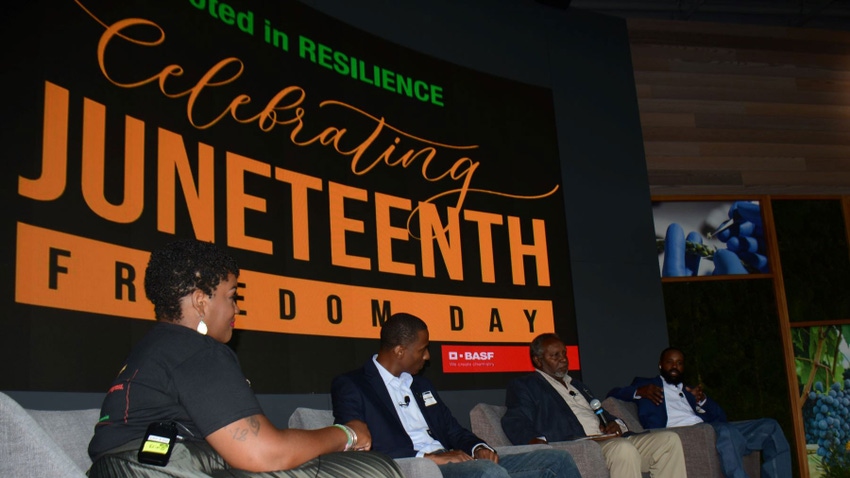
At a Glance
- Black farmers value advocacy of National Black Growers Council.
- Challenges seen for new technology reaching Black-owned farms.
On Juneteenth, BASF brought in three Black farmers to the company’s Center for Sustainable Agriculture in Research Triangle Park, N.C. to discuss challenges they face today as black farmers.
In essence, the farmers, Willis Nelson, Sr. of Sondheimer, La.; Ronald Bunton of Woodburn, Ky.; and Patrick Smith of Greenville, Miss. said all farmers should be treated equally when it comes to farm loans, USDA programs, and service from crop protection product companies.
Juneteenth became a federal holiday in 2021 after President Joe Biden signed the Juneteenth National Independence Act into law. Deriving its name from combining June and nineteenth, it is celebrated on the anniversary of the order by Major General Gordon Granger proclaiming freedom for enslaved people in Texas on June 19, 1865, two and a half years after the Emancipation Proclamation was issued.
In the June 19 forum, Nelson, Bunton, and Smith all said Black farmers face unique challenges. All three farmers serve on the board of the National Black Growers Council (NBGC) and say the organization is a vital advocate for Black farmers. The mission of NBGC, based in Pine Bluff, Ark., is to improve the efficiency, productivity, and sustainability of Black farmers.
Nelson, who farms with his three brothers and father in Sondheimer, in northeastern Louisiana, noted that his father and grandfather were told they didn’t have the know-how to farm. He said Black farmers were told they could do the work, but they didn’t have the expertise.
“It started with share cropping, all the way to here. I wanted to break the narrative and show that we are successful farmers, period,” Nelson said.
The Nelson family farm was started by Willis Nelson’s grandfather, Will. Today, the family produces corn, cotton, soybeans, wheat, and milo not far from the Mississippi River. As a board member, Nelson is very active in NBGC.
“It’s a great community, a family as I call it. It helps me thrive knowing that there are others doing the same thing. I value the sharing of information. It’s very supportive,” Nelson said.
And due to the history of discrimination and racism Black farmers face, Nelson said he supports NBGC because “I’m going to go with someone I believe has my best interest.”
Bunton, who produces corn, wheat, soybeans, and cattle in Woodburn, Ky. said NBGC allows Black farmers to learn more about USDA programs, what chemicals are working the best, and what crops are performing the best across the country.
“We do a phone call once a month to see how everybody is doing, and how’s the weather going, and how you’re surviving, and what struggles you are having. And then everybody is on the same page,” Bunton said.
Smith, who produces corn, soybeans, and wheat in Greenville, Miss., said NBGC is great because it is a supportive organization where Black farmers can talk to each other about farming. “We know what to grow and what not to grow, what to do and when to do it. It’s a good thing. We support and help one another, and we thrive on that.”
Each farmer also noted that it is a challenge for new technology and innovation to make it to Black-owned farms.
“We don’t know about a lot of new innovations coming out because we don’t get that on our farm. It’s going to get tried on everyone else’s farm before it comes to our farm. If we have the opportunity to get the new technology, to see how it works personally, hands on, I would be very excited about that. I would like to try a new product on my farm before someone else,” Nelson said.
Bunton said the availability of new technology to Black farmers remains a concern for NBGC. He said new technology and innovation should be equally available to all farmers.
“We want to be on the same line as our counterparts. If you thought enough to take your chemicals to a counterpart that’s farming 6,000 acres, you ought to be able to take it to the guy who’s farming 100 acres, that’s a different color, and let him try it. If this guy’s got 6,000 acres, and putting it on 600, this guy who’s got 100 acres ought to be able to put it on 10 acres of his crop,” Bunton said.
“As an organization, we’re saying it’s a lot easier if the chemical companies would be diversified enough to where they would go to different organizations like the National Black Growers. If you’re going to go to the National Corn Growers, and let them try a chemical, or the soybean growers, you ought to let the National Black Growers try it,” Bunton said. “We want the same opportunity as the next farmer.”
Finally, Smith noted that it was tough when his dad started farming in the Mississippi Delta, but he made it work. “It was tough for a black man to have his own land when my dad started. It was always said that you couldn’t farm, you couldn’t buy land. We worked hard. We came together. We loved farming. We made it work.”
Smith said he teaches young Black farmers that “it’s not about being clean all the time. It’s about getting dirty. Dirt pays off. Dirt grows weeds. Dirt grows crops. Behind that, dirt grows money.”
He said all farmers must be treated equally, regardless of their color. “We want the same opportunities that everybody else has.”
About the Author(s)
You May Also Like






